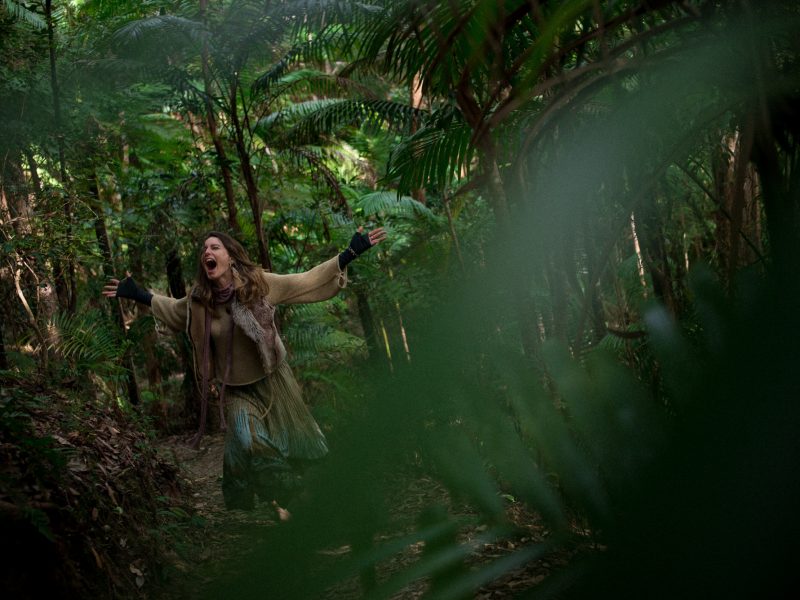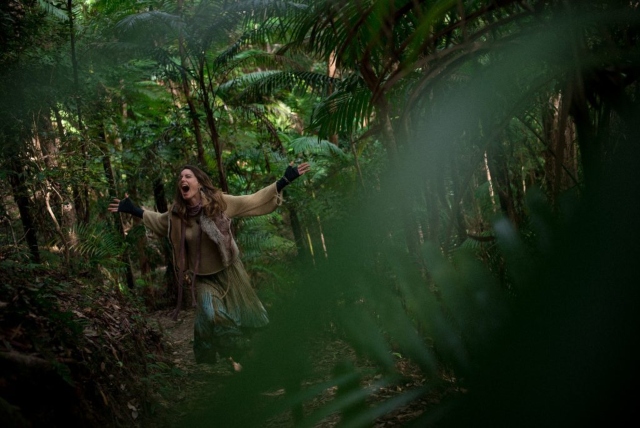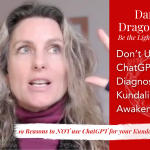The short answer is yes. However, this does not mean that every experience of psychosis is attributable to Kundalini Awakening. And even if the experience of psychosis has been triggered by the activation of Kundalini energy, it can still be necessary to use medication, therapy, or other western medial interventions in order to stabilise the person’s psyche, and support the healing and recovery.
For those who are on a “spiritual path”, there can be a danger of spiritually by-passing experiences of mental illness that still require medication, therapy or other medical interventions, no matter what their origin cause.
This by-passing can be dehabilitating for the person, and ultimately cause even more suffering and harm. Ironically, this is a further denial of life as it is, when true spiritual awakening is meeting life exactly as it is, illness and all.
It can be attractive to believe that an experience of mental illness has a spiritual origin. But whether or not this is true, it doesn’t change the necessity for appropriate treatment.
I had two experiences of psychosis a month apart in 2004, and even though I suspected my experience was related to Kundalini, I still took medication for about six months to support the stabilisation of my psyche. In that six months, I made significant lifestyle changes, built a strong foundation in my life, and started to attend to the mental and emotional causes of my experience. When I did go off medication, I tapered down slowly with the support of my friends and family to provide feedback if my behaviour changed at all.
My practice of yoga was a key aspect in my recovery, but it was not the only aspect. I was also examining all the underlying mental and emotional patterns that had contributed to my distress.
Tara Springett, who is a Buddhist teacher and therapist with activated Kundalini outlines what she says are the key differences between Kundalini-induced psychosis, and ordinary psychosis. These are:
Kundalini-Induced Psychosis
- A functioning sense of self remains
- They will ask for help
- They can pinpoint exactly when the crisis began.
- They can remember what it’s like to be ‘normal’ and wants to return to that state
- They can articulate what’s happening in their mind.
- There’s a strong urge to make life more loving, healthy and spiritual.
Ordinary Psychosis
- No functioning sense of self remains
- They are reluctant to ask for help
- Psychosis develops slowly and over a period of time
- They can’t remember what it’s like to be ‘normal’.
- They don’t want to talk about what’s going on in their mind.
- They’ll often turn away from loving, health or spiritual aspects of their life, or relationships
This list is not exhaustive, and it is not necessarily always true either. For example, when I was experiencing psychosis, which both times happened over a period of about 5 – 9 days, I didn’t ask for help or share what was going on in my mind. This was because of my lack of trust in other people, and my inability to be vulnerable. I didn’t feel safe asking for help or sharing the truth of my inner world with other people. (That’s an example of some of the unresolved childhood trauma I carried that meant the awaking led to psychosis.)
However, afterward, when I began to write about my experiences, I was able to easily articulate what had been happening in my mind, and there was a strong urge to make life loving, health,y and spiritual.
Writing about my experiences, while working in-depth with yoga, and healing the mental/emotional aspects of my psyche that had led to my psychosis, supported the stabilisation and integration of my Kundalini Awakening.
It also highlighted the dangers of spontaneous Kundalini Awakening in individuals like myself who may have unresolved mental and emotional trauma.
The phenomena of Kundalini Awakening and its intersection with psychosis have been studied by some notable practitioners, including Bruce Greyson, Professor Emeritus of Psychiatry and Neurobehavioral Sciences at the University of Virginia. The article where this extract (below) appeared in The Journal of Transpersonal Psychology. It looks at the work of Itzhak Bentov, a biomedical engineer who studied the physiological effects of altered states of consciousness, amongst others. Bentov came up with a model called physio-kundalini syndrome to explain what happens in some people when Kundalini actives.
Lee Sannella, a psychiatrist, and ophthalmologist, and author of ‘Kundalini: Psychosis or Transcendence’, called Bentov’s model ‘the best available.
Bonnie Greenwell Ph.D. is another researcher, transpersonal psychotherapist and non-dual teacher in the lineage of Adyashanti. She wrote Energies of Transformation: A Guide to the Kundalini Process based on her doctoral research.
All of these researchers, highly respected in their field, agree that Kundalini can trigger psychosis, depending on the person’s mental and emotional make-up. People with unresolved trauma or other pathology are most at risk.
Greenwell (1990) notes that the more drastic psychological effects of kundalini awakening, such as hallucinations, may lead therapists unfamiliar with the phenomenon to consider it a psychosis, neurological disorder, or manic-depressive illness. She suggests that kundalini has been linked to psychosis because some kundalini symptoms appear similar to a psychotic break and because therapists lack other diagnostic categories in which to categorize hallucinatory experiences. Like Aurobindo, however, she does not believe that kundalini or inappropriate treatment of it can cause psychosis, or that spiritual components of psychosis are necessarily evidence of kundalini awakening. Rather, she suggests that spontaneous kundalini awakening in individuals with borderline or narcissistic pathology may precipitate psychosis, or that weak ego boundaries or disturbed energetic phenomena in psychosis may activate physiological processes similar to those of kundalini, leading to confusion between the two.
THE PHYSIO-KUNDALINI SYNDROME AND MENTAL ILLNESS
Bruce Greyson
If you, or a friend of family member has had psychosis that may be related to Kundalini Awakening:
- Stop all spiritual practice, for now, particularly meditation and pranayama. (Gentle asana can still be beneficial).
- Focus on the basics – eat healthy, wholesome, grounding food, get good regular sleep, walk in nature, spend time with animals, and loving friends and family.
- Seek the appropriate medical treatments and/or interventions (including medication).
- If a diagnosis has been given (I was labeled bi-polar) don’t waste energy debating it, or reacting to it. Instead, recognise that it’s just a way of looking at something in order to determine treatment. It does not define “who you are”.
- Find a therapist who understands spiritual emergence, and works in a somatic and energy-informed manner.
- Find a spiritual teacher who understands Kundalini, and the impact that emotional/mental patterns or issues can have on its activation.
Ideally, the work of your therapist and your teacher will inform each other. A good spiritual teacher will be able to give you practices useful for grounding and integrating the energetic aspects of your experience and steer you away from practices that can lead to disassociation or transcendence. They may provide practices for working directly with the emotional/mental body that complements the work you’re doing with your therapist. They will also share with you View Teachings that provide grounding and context for what’s unfolding.
And, a wise spiritual teacher will also work within the scope of their practice – spirituality – and defer to the therapist as appropriate. Of course, there’s a lot of overlap between the spiritual path, trauma and mental health and well-being. They’re not really separate. However, a therapist has a different orientation and body of training from a spiritual teacher, which is why it can be useful to work with both, if possible. Or, find someone, like Bonnie L. Greenwall, who is both a therapist and a spiritual teacher.
Working with a therapist who has no spiritual practice, or framework can be detrimental because they won’t understand what spiritual emergence, or kundalini, is really all about.
Psychotherapists dealing with hysterical overlays, or psychotic reactions to kundalini awakening, are reminded that underneath the neurosis, or psychosis, a process is occurring that is far beyond our ordinary understanding of psychopathology and ecstatic religious states.
‘Kundalini: Psychosis or Transcendence’, Lee Stanella
This process is the liberation process, whereby the energy of Kundalini seeks to purify the physical, mental/emotional, and energetic body. This purification process can cause all kinds of symptoms including spontaneous body movements or postures (kriyas), heat, tingling, or body sensations. The blockages within the physical, mental/emotional, and energetic body are what cause the symptoms of distress. When people learn how to orientate to Essence Nature (sometimes called awareness or true nature) then it’s much easier to simply allow Kundalini to do its thing without reacting against, contracting, or causing further obstructions.
It’s this resistance or contraction to what is unfolding that can exacerbate the symptoms. These patterns are often the adaptive strategies adopted in childhood in response to childhood developmental trauma. I had long-standing patterns of minimising and denying my emotional experiences and disassociating. This, combined with the energy and process of Kundalini activation, is why I wasn’t able to stay grounded and hold the intensity of emotions coming through me. Kundalini didn’t cause the psychosis – these patterns did.
In its rise, kundalini causes the central nervous system to throw off stress. The stress points will usually cause pain during meditation. When kundalini encounters these stress points or blocks, it begins to act on its own volition, engaging in a self‐directed, self‐limited process of spreading out through the entire physio‐psychological system to remove these blocks. Once a block is removed, kundalini flows freely through that point and continues its upward journey until the next stress area is encountered. Further, the kundalini energy diffuses in this journey, so that it may be operating on several levels at once, removing several different blocks. When the course is completed, the energy all becomes focused again at the top of the head. The difference between this final state and the initial state is not simply that kundalini is focused in a different place, but that in the meantime it has passed through every part of the organism, removing blocks and awakening consciousness there. Thus, the entire process of kundalini action can be seen as one of purification or balancing.
‘Kundalini: Psychosis or Transcendence’, Lee Stanella
It’s the purification process that generates many of the symptoms of an active Kundalini, but it is not the actual ‘awakening’ itself. A genuine ‘awakening’ is a paradigm shift in one’s experience of reality, not an energetic or spiritual experience (see the video below for more on that). That paradigm shift can be incredibly destabilising if at least some of the purification work on the psyche and energy body has not already happened.
In my experience, the paradigm shift only lasted for a number of days, and I was not grounded, nor lucid within it. When I started going into intense kriyas, my then-partner and friend took me to the psych ward where I was medicated and diagnosed bi-polar. When I woke up, I was back in the regular paradigm – which in comparison to the awake paradigm felt like hell. The awakening was not abiding, and instead revealed to me the hard work that now needed to be done to liberate me from myself and all my conditioning. Or at least, enough of the conditioning that abiding in essence nature (the paradigm shift) was again possible and easeful.
My teacher Christopher Wallis has this to say on the subject:
Awakening can be accompanied by something like a temporary psychotic break (often related to the realization that everything one believed to be true is just cultural conditioning, a realization that can unhinge anyone if it comes on too fast, as it were). Ultimately the distinction that must be drawn between the two is that awakening is salutary, and psychosis is not. Awakening eventually stabilizes in a more open, vivid, enhanced, unified, flexible, free, and loving experience of life. So there is really no point in labelling any neuro-atypical states as having anything to do with awakening except as a way of indicating, in the case of a given person, that those states enabled a durable shift into a paradigm characterised by most or all of the adjectives I just used above.
Christopher Wallis
That is, psychosis related to a kundalini awakening will eventually stabilize into ‘a more open, vivid, enhanced, unified, flexible, free, and loving experience of life’.
I would add a caveat to that. This is possible if the person has the correct context, teachings, and teacher to support their ability to ground and integrate their experience. If the person is trapped within the Western Medical Model with no understanding or access to the context, teachings, and teachers then it can be much harder to ground and integrate the experience of psychosis. This is why finding a therapist who is also a spiritual teacher can be so beneficial. Or at least, a therapist who is a dedicated spiritual practitioner. They then bring a different context to the experience of psychosis, regardless of its origins, whereby they’re working with the wholeness of the person beyond the experience of mental illness.
This creates a very different context from the Western Medical Model. The person is not broken or ill, they are having an experience where their mind is broken or ill. That slight shift in identification can make a huge difference in the healing and recovery process. Context, and how we identify with what’s unfolding provide the narrative which shapes the outcome of our experience. I’ve written about this extensively in my memoir, Sex, Drugs & (mostly) Yoga.
I also work with people to support this integration process – check out this four-week course as an example.
My own experiences of awakening/psychosis happened in August and September 2004. It took at least 12 years, possibly a bit more, before I was able to fully integrate what had happened, and begin the work of stabilising within the new paradigm. And yes, now my life is an open, vivid, enhanced, unified, flexible, free, and loving experience.
And what about those of you who have read through this and feel that your experience may be “ordinary psychosis”?
In many ways, this changes nothing. If you apply the same framework of healing and recovery as someone who may have had a kundalini-induced psychosis, you will likely maximise your recovery.
Work with a therapist who is somatic-informed, and possibly even grounded in non-dual therapy. Find a spiritual teacher who understands the mental/emotional healing process. And write a narrative that supports your healing. Recognise that psychosis is an invitation to heal the psyche, no matter what the origins of the experience.
Dr. Paris Williams conducted a series of research studies on people who had experienced psychosis and discovered that all of them, due to the nature of the healing journey they subsequently went on, now experience ‘a degree of well-being and resilience that far surpasses that which existed prior to their psychosis’. He also notes that the people he researched all said that psychiatric treatment caused more harm than benefit in their recovery.
Psychosis is not the result a diseased brain. Rather, it is probably much more accurate to see psychosis as a desperate survival strategy brought on intentionally by one’s own being. It seems that all of us, and indeed all living organisms, are imbued with an unfathomable intelligence and force that drives constantly for our survival and our growth; and it appears that is is they very same orgasmic intelligence that initially initiate psychosis in a desperate attempt to survive what would otherwise be intolerable conditions.
Re-thinking Madness: Towards a Paradigm Shift in our Understanding and Treatment of Psychosis by Dr. Paris Williams
This context or narrative – psychosis is an invitation to healing and recovery, an invitation to growth – will ultimately benefit any person who has experienced psychosis, regardless of origins. Conversely, if someone has had a kundalini-induced psychosis, then uses the ‘spiritual nature of the unfolding to avoid medication, treatment or confronted patterns of the mental/emotional body, then that becomes detrimental to the healing process.
Meet whatever is happening, fully, with whatever support and resources you require. And allow this unfolding to reveal greater resilience and well-being.
Blessings on your path,
Kara-Leah
Learn how to navigate your new normal
Join Kara-Leah on a 4-week course & explore the roadmap and practices necessary to integrate YOUR Kundalinī Awakening. Discover how to avoid the traps, obstacles, and pitfalls along the way. Meet the challenges of Kundalinī Awakening with ease and make the most of the energy and wisdom now available to you.
Online | $97 🇨🇦







 Battling Spiritual Materialism: That Time I was Kicked off an Online Summit
Battling Spiritual Materialism: That Time I was Kicked off an Online Summit